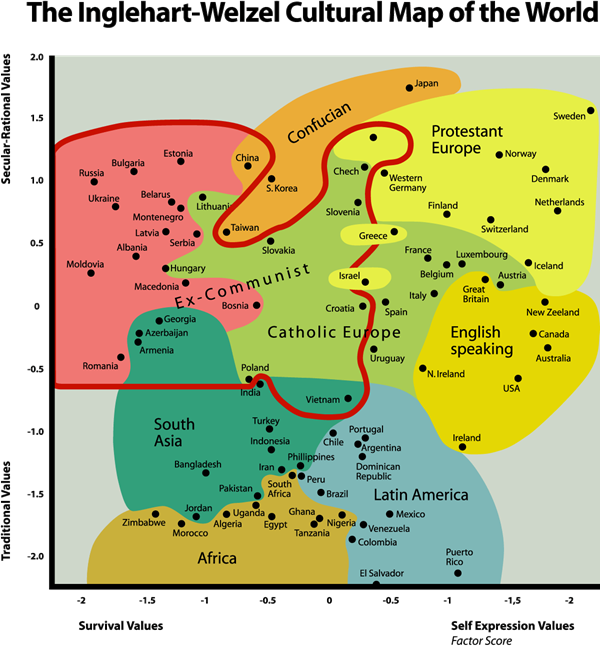Steering Clear of Culture Clashes in International Business
Often times when companies seek to expand their business overseas they think in terms of geographic proximity but what about cultural proximity?
Countries can be quite close geographically but oceans apart culturally, and that’s a fact often lost on business leaders in our increasingly globalized world, according to Joe Carella, managing director of executive education at the Thunderbird School of Global Management.
Carella addressed that paradox during a presentation at SPI’s recent Equipment and Moldmakers Leadership Summit (Oct. 26-28; Tucson, Ariz.). Carella began with some attention-grabbing numbers on just how globalized the world has become over the last two decades. In 1990, there were only 3000 “multinational” companies, but by 2010, that number had exploded to 80,000 multinational companies, which themselves had an additional 800,000 affiliates.
“The typical global growth strategy for a company is pretty simple,” Carella said, “go from mature markets to mature markets. Right now, we are at a time of profound change with a lot of innovation going on—new products, and new markets with a lot of potential. It’s reassuring to do business where your colleagues do, but the reality is markets are more complex than that. Only your actions determine whether you're going to be successful or not.”
To help display that complexity, Carella included a slide with the Inglehart-Welzel Cultural Map of the World. This “map” looks at countries distance from each other in terms of cultural values versus geographical space. Arranged as a graph, along the y-axis the map has survival values and self-expression values, while along the x-axis, it charts traditional values and secular-rational values.
With this system, nations are grouped along historic cultural boundaries, including Confucian, Orthodox, Islamic, Africa, Latin America, English Speaking, Protestant Europe, Catholic Europe, and South Asia.
“This is a great lens to see who you could do business with that you have not done business with before,” Carella said. On this map, seemingly disparate countries like Poland and India are actually next door neighbors when it comes to their value systems.
“In a time of change, it’s important to reconsider what binds you to others and how you understand what binds you to others, how you make connections,” Carella said.
Part of understanding those ties that bind is awareness of influences on individual behavior. To help visualize this, Carella displayed a pyramid with human nature at the base, culture in the middle, and personality/style at the top.
At the bottom of the pyramid, the influences are universal and innate, Carella said. While in the middle, they are specific to a group or category and learned, and at the top, they are specific to each individual can be innate or learned. At first blush complicated, this can be simplified as well.
“We are all ruled by fears, we are all ruled by hopes, no matter where you go in the world,” Carella said, “so there are many things that could bind you to people all over the world.”
Culture Clash
Even with cultural awareness, difficulties are inevitable when companies try to forge business relationships outside their own space. The top three problems identified in a Thunderbird survey were:
- Different working styles and office norms
- Inability to understand local culture
- Cultural or national conflicts between staff
To overcome these and other challenges, Carella said leaders must develop a “global mindset”, defined as:
A set of individual characteristics that helps a global leader better influence individuals, groups, organizations and systems unlike his or her own.
“The ultimate challenge for a global leader is the ability to influence, and how do you influence others?,” Carella asked. “Communicating, trust, and research—understanding their mores. Communication is not just sharing but also listening. Ultimately you influence people by building trust.”
Even when you’re able to exert influence, Carella said truly successful global managers are able to let go of something they’re typically loath to: control. “The change you need to see within yourself, is not where you better understand culture or language alone, but the change is with being comfortable with being uncomfortable in uncomfortable situations,” Carella said. “Be comfortable with the fact that your expectations, the ones you have in your normal setting, are not going to be met.”
Carella closed with five "simple" and "hard" rules when working internationally:
"Simple" Rules
- Be patient when building trust and relationships.
- Speak more slowly than you normally do. Carella: “I see this especially when I deal with technical sales people—they get so passionate about the product, go million miles per hour.”
- Avoid slang, buzzwords cultural references. Carella: “Things that you take for granted—a slam dunk, for instance—that you think everyone should know, are not necessarily something others understand.”
- Pay attention to non-verbal clues.
- Build knowledge of your target market.
“Hard” rules
- Build networks, not one-on-one connections.
- Respect differences.
- Recognize the complexity.
- Be self aware and balance between the cultures and values.
- Test your knowledge with in country representatives.
“Global leaders need to manage across diverse cultural systems, diverse political and institutional systems, time and geographic distance, as well as individual and group preferences,” Carella said. Despite those myriad challenges, and the cultural chasm, he offered a hopeful insight.
“The world is full of different political systems, but business succeeds in all of them, shouldn't you be successful in them too?”

Read Next
Don’t Let Your New Strategy Succumb to Your Old Culture
A well-conceived strategy can help your company overcome many external challenges but there is one adversary it will fall to every time—an internal culture at cross purposes.
Read MoreDon’t Let Your New Strategy Succumb to Your Old Culture
A well-conceived strategy can help your company overcome many external challenges but there is one adversary it will fall to every time—an internal culture at cross purposes.
Read MoreDon’t Let Your New Strategy Succumb to Your Old Culture
A well-conceived strategy can help your company overcome many external challenges but there is one adversary it will fall to every time—an internal culture at cross purposes.
Read More


















